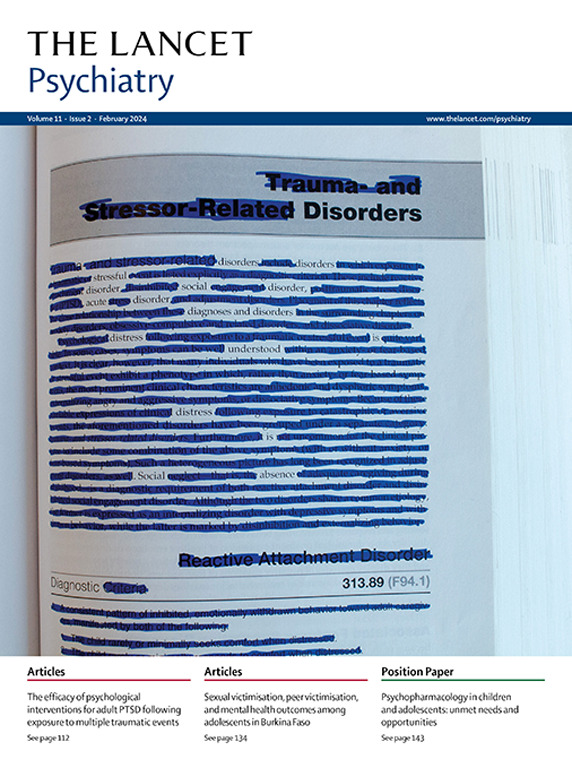在英格兰和威尔士,基于精神化治疗的反社会人格障碍男性罪犯的社区缓刑(犯罪成年男性精神化,MOAM):一项多中心、评估盲法、随机对照试验
IF 30.8
1区 医学
Q1 PSYCHIATRY
引用次数: 0
摘要
反社会人格障碍是一个重大的健康和社会问题,但对其可治疗性的怀疑限制了心理治疗证据基础的发展。针对反社会人格障碍(MBT- aspd)量身定制的精神化治疗(MBT)可以通过提高理解和调节思想和情感的负面影响的能力来解决问题行为。本研究旨在评估MBT-ASPD与常规缓刑相比在减少攻击行为方面的临床和成本效益,从基线到12个月的随访。方法成年男性犯罪心理化(MOAM)试验是在英格兰和威尔士进行的一项多中心、两组、实用主义、评估器屏蔽、随机对照的优势试验。符合条件的参与者是男性,年龄在21岁或以上,被定罪并在13个地点之一的国家缓刑服务监督下,通过社区人格障碍途径服务确定,符合DSM-5反社会人格障碍标准,并且在公开攻击量表-修改(OAS-M)中得分至少为15分。经过三个阶段的筛选过程,同意的参与者被随机分配(1:1),按地点、年龄、缓刑顺序类型和剩余的缓刑时间进行分层,分为MBT-ASPD加通常的缓刑,或单独的缓刑。MBT-ASPD组的参与者接受为期12个月的每周75分钟的小组治疗和每月50分钟的个人治疗。一般来说,试用期长达12个月,之后参与者继续在国家缓刑服务处的监督下完成剩余的任期。调查人员和数据收集人员对治疗分配不知情。在随机分配后的12个月,OAS-M测量的主要结局是攻击性。数据由一个由传统研究人员和具有刑事司法系统实际经验的研究人员组成的混合小组收集。使用线性混合效应模型在意向治疗人群中进行初步分析,并在每个随访时间点(第3、6、9、12、15、18、21和24个月)调整基线。该试验已在ISRCTN注册(ISRCTN 32309003),所有预先计划的随访均已完成。在2016年1月2日至2018年8月31日期间,1946人被纳入研究;筛选过程后,随机分配313名参与者(156名[50%]按常规进行试用期,157名[50%]按常规进行MBT-ASPD +试用期)。参与者的平均年龄为34.2岁(SD为9.3);大多数参与者(247人[79%])被认定为英国白人、爱尔兰白人或其他白人;其次是英国黑人(加勒比人、非洲人或其他种族);30[10%])或混合(29[9%])。在随机分配12个月后,观察正常组的平均OAS-M得分(186分[SD 153])显著高于MBT-ASPD组(90分[126]),两组间校正后的平均差异为- 73.5 (95% CI为-113·7 ~ -33·2);P< 0.0001,中大型效应量为0.74。在试验期间,7名参与者死亡,1名推定死亡,在随机分配后,所有参与者都在正常的试用期组中,死亡被认为与试验程序无关。mbt - aspd有望在法医人群中成为反社会人格障碍患者的有效干预手段。未来的研究应该探索这些发现的普遍性和治疗效果的可持续性。资助国家卫生研究所卫生技术评估方案。本文章由计算机程序翻译,如有差异,请以英文原文为准。
Mentalisation-based treatment for antisocial personality disorder in males convicted of an offence on community probation in England and Wales (Mentalization for Offending Adult Males, MOAM): a multicentre, assessor-blinded, randomised controlled trial
Background
Antisocial personality disorder is a major health and social problem, but scepticism about its treatability has restricted development of the evidence base for psychological treatments. Mentalisation-based treatment (MBT) tailored for antisocial personality disorder (MBT-ASPD) can address problematic behaviours by improving the ability to understand and regulate the negative effects of thoughts and feelings. This study aimed to evaluate the clinical and cost-effectiveness of MBT-ASPD compared with probation as usual in reducing aggressive behaviours from baseline to 12 months of follow-up.Methods
The Mentaliziation for Offending Adult Males (MOAM) trial was a multicentre, two-group, pragmatic, assessor-masked, randomised controlled superiority trial in England and Wales. Eligible participants were male, aged 21 years or older, convicted of an offence and under National Probation Service supervision at one of 13 sites, identified through the Community Personality Disorder Pathways Service, met DSM-5 criteria for antisocial personality disorder, and scored at least 15 on the Overt Aggression Scale-Modified (OAS-M). After a three-stage screening process, consenting participants were randomly allocated (1:1), stratified by site, age, probation order type, and remaining probation duration, to either MBT-ASPD plus probation as usual, or probation as usual alone. Participants in the MBT-ASPD group were offered 12 months of weekly 75-min group therapy sessions and monthly 50 min individual sessions. Probation as usual lasted up to 12 months, after which participants continued under National Probation Service supervision for the remainder of their term. Investigators and data collectors were masked to treatment allocation. The primary outcome was aggression measured by the OAS-M at 12 months after random allocation. Data were collected by a hybrid team of traditional researchers and researchers with lived experience of the criminal justice system. The primary analysis was conducted in the intention-to-treat population using a linear mixed-effects model, adjusted for baseline at each follow-up timepoint (months 3, 6, 9, 12, 15, 18, 21, and 24). This trial is registered with ISRCTN (ISRCTN 32309003), and all pre-planned follow-ups are complete.Findings
Between Jan 2, 2016, and Aug 31, 2018, 1946 individuals were referred to the study; after the screening process, 313 participants were randomly allocated (156 [50%] to probation as usual and 157 [50%] to MBT-ASPD plus probation as usual). Participants had a mean age of 34·2 years (SD 9·3); the majority of participants (247 [79%]) identified as White British, Irish, or White Other; followed by Black British (Caribbean, African, or Other; 30 [10%]) or Mixed (29 [9%]). At 12 months after random allocation, mean OAS-M scores were significantly higher in the probation as usual group (mean score 186 [SD 153]) than in the MBT-ASPD group (90 [126]), with an adjusted mean difference between groups of –73·5 (95% CI –113·7 to –33·2); p<0·0001, with a medium-to-large effect size of 0·74. During the trial, seven participants died, and one presumed death occurred, all in the probation as usual group after random allocation, with none of the deaths deemed related to trial procedures.Interpretation
MBT-ASPD holds promise as an effective intervention for individuals with antisocial personality disorder within a forensic population. Future research should explore these findings’ generalisability and the sustainability of treatment gains.Funding
National Institute for Health Research Health Technology Assessment programme.求助全文
通过发布文献求助,成功后即可免费获取论文全文。
去求助
来源期刊

Lancet Psychiatry
PSYCHIATRY-
CiteScore
58.30
自引率
0.90%
发文量
0
期刊介绍:
The Lancet Psychiatry is a globally renowned and trusted resource for groundbreaking research in the field of psychiatry. We specialize in publishing original studies that contribute to transforming and shedding light on important aspects of psychiatric practice. Our comprehensive coverage extends to diverse topics including psychopharmacology, psychotherapy, and psychosocial approaches that address psychiatric disorders throughout the lifespan. We aim to channel innovative treatments and examine the biological research that forms the foundation of such advancements. Our journal also explores novel service delivery methods and promotes fresh perspectives on mental illness, emphasizing the significant contributions of social psychiatry.
 求助内容:
求助内容: 应助结果提醒方式:
应助结果提醒方式:


